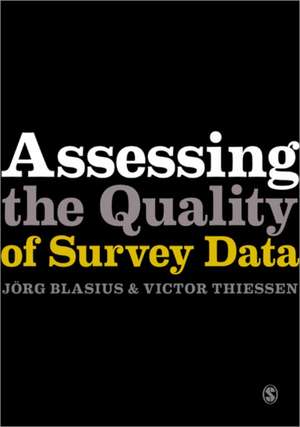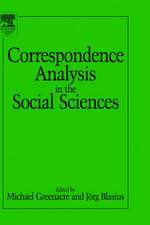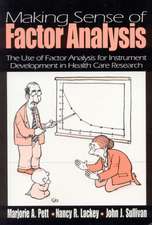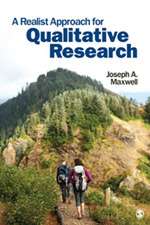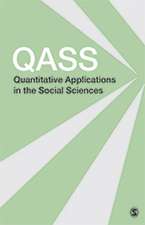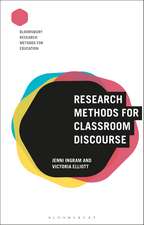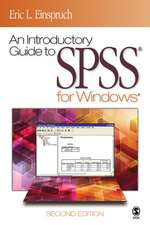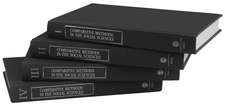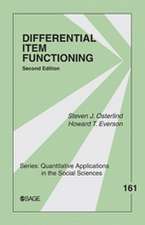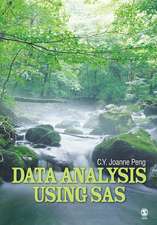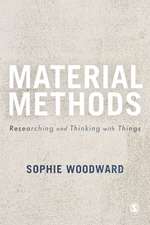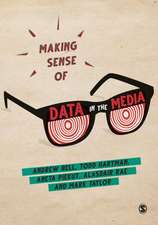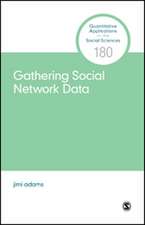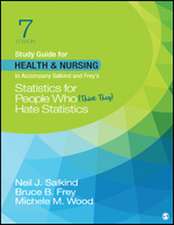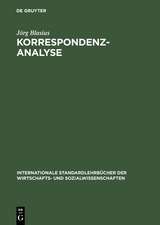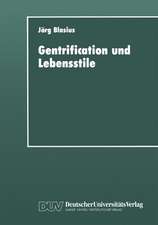Assessing the Quality of Survey Data: Research Methods for Social Scientists
Autor Jörg Blasius, Victor Thiessenen Limba Engleză Paperback – 20 feb 2012
Preț: 484.53 lei
Nou
Puncte Express: 727
Preț estimativ în valută:
92.73€ • 100.69$ • 77.89£
92.73€ • 100.69$ • 77.89£
Carte tipărită la comandă
Livrare economică 22 aprilie-06 mai
Preluare comenzi: 021 569.72.76
Specificații
ISBN-13: 9781849203326
ISBN-10: 1849203326
Pagini: 192
Dimensiuni: 170 x 242 x 14 mm
Greutate: 0.34 kg
Ediția:New.
Editura: SAGE Publications
Colecția Sage Publications Ltd
Seria Research Methods for Social Scientists
Locul publicării:London, United Kingdom
ISBN-10: 1849203326
Pagini: 192
Dimensiuni: 170 x 242 x 14 mm
Greutate: 0.34 kg
Ediția:New.
Editura: SAGE Publications
Colecția Sage Publications Ltd
Seria Research Methods for Social Scientists
Locul publicării:London, United Kingdom
Recenzii
This is an innovative book. Blasius and Thiessen show how careful data-analysis can uncover defects in survey data, without having recourse to meta-data or other extra information. This is good news for researchers who work with existing data sets and wish to assess their quality
Joop Hox
Professor of social science methodology, Utrecht University
'This illuminating and innovative book on the quality of survey data focuses on screening procedures that should be conducted prior to assessing substantive relations. Numerous tables and visual displays based on appropriate analyses show convincing examples of procedural deficiencies, data duplicates, and faked interview, and unusual patterns in well known international datasets. Blasius and Thiessen discuss openly what is mostly covered in survey reporting, and they show ways to improve the reliability of conclusions based on survey data. A must for survey practitioners and users
Jaak Billiet
Emeritus professor in social methodology, University of Leuven
'I hope that many social science researchers will read Jörg Blasius and Victor Thiessen's book and realize the importance of the lesson it provides, which is that many of our data sets contain serious errors which may lead to wrong conclusions if not wrong theories. Applying the suggested tests can prevent this.
Willem Saris
Director of RECSM, Universitat Pompeu Fabra, Barcelona
This is an important, groundbreaking analysis of survey data quality that serves as an indispensable vade mecum for anyone engaged in gathering, analysing or utilising survey data. Clearly quality is not always what is appears to be... Assessing the Quality of Survey Data... addresses this issue in far more detail than any other work known to this reviewer.
Maryam Nazari and G. E. Gorman
Online Information Review
Assessing the Quality of Survey Data has been written for all researchers who want to be good data detectives... This book has some considerable strengths. It really got me to reflect on the assumptions I had made about data sets I had handled. It highlighted how relatively easy it is to spot data issues early on in analysis. It also made me think of response style challenges to be more than a survey design/sampling issues and to include much more data screening. Although I won’t be setting up my own detective agency, I have certainly picked up some sleuthing tips.
Catherine Owens
SR: Reviews
Joop Hox
Professor of social science methodology, Utrecht University
'This illuminating and innovative book on the quality of survey data focuses on screening procedures that should be conducted prior to assessing substantive relations. Numerous tables and visual displays based on appropriate analyses show convincing examples of procedural deficiencies, data duplicates, and faked interview, and unusual patterns in well known international datasets. Blasius and Thiessen discuss openly what is mostly covered in survey reporting, and they show ways to improve the reliability of conclusions based on survey data. A must for survey practitioners and users
Jaak Billiet
Emeritus professor in social methodology, University of Leuven
'I hope that many social science researchers will read Jörg Blasius and Victor Thiessen's book and realize the importance of the lesson it provides, which is that many of our data sets contain serious errors which may lead to wrong conclusions if not wrong theories. Applying the suggested tests can prevent this.
Willem Saris
Director of RECSM, Universitat Pompeu Fabra, Barcelona
This is an important, groundbreaking analysis of survey data quality that serves as an indispensable vade mecum for anyone engaged in gathering, analysing or utilising survey data. Clearly quality is not always what is appears to be... Assessing the Quality of Survey Data... addresses this issue in far more detail than any other work known to this reviewer.
Maryam Nazari and G. E. Gorman
Online Information Review
Assessing the Quality of Survey Data has been written for all researchers who want to be good data detectives... This book has some considerable strengths. It really got me to reflect on the assumptions I had made about data sets I had handled. It highlighted how relatively easy it is to spot data issues early on in analysis. It also made me think of response style challenges to be more than a survey design/sampling issues and to include much more data screening. Although I won’t be setting up my own detective agency, I have certainly picked up some sleuthing tips.
Catherine Owens
SR: Reviews
Cuprins
Conceptualizing Data Quality: Respondent Attributes, Study Architecture, and Institutional Practices
Conceptualizing Response Quality
Study Architecture
Institutional Quality Control Practices
Data Screening Methodology
Chapter Outline
Empirical Findings on Quality and Comparability of Survey Data
Response Quality
Approaches to Detecting Systematic Response Errors
Questionnaire Architecture
Cognitive Maps in Cross-Cultural Perspective
Conclusion
Statistical Techniques for Data Screening
Principal Component Analysis
Categorical Principal Component Analysis
Multiple Correspondence Analysis
Conclusion
Institutional Quality Control Practices
Detecting Procedural Deficiencies
Data Duplication
Detecting Faked and Partly Faked Interviews
Data Entry Errors
Conclusion
Substantive or Methodology-Induced Factors? A Comparison of PCA, CatPCA and MCA Solutions
Descriptive Analysis of Personal Feelings Domain
Rotation and Structure of Data
Conclusion
Item Difficulty and Response Quality
Descriptive Analysis of Political Efficacy Domain
Detecting Patterns with Subset Multiple Correspondence Analysis
Moderator Effects
Conclusion
Questionnaire Architecture
Fatigue Effect
Question Order Effects
Measuring Data Quality: The Dirty Data Index
Conclusion
Cognitive Competencies and Response Quality
Data and Measures
Response Quality, Task Simplification and Complexity of Cognitive Maps
Conclusion
Conclusion
Conceptualizing Response Quality
Study Architecture
Institutional Quality Control Practices
Data Screening Methodology
Chapter Outline
Empirical Findings on Quality and Comparability of Survey Data
Response Quality
Approaches to Detecting Systematic Response Errors
Questionnaire Architecture
Cognitive Maps in Cross-Cultural Perspective
Conclusion
Statistical Techniques for Data Screening
Principal Component Analysis
Categorical Principal Component Analysis
Multiple Correspondence Analysis
Conclusion
Institutional Quality Control Practices
Detecting Procedural Deficiencies
Data Duplication
Detecting Faked and Partly Faked Interviews
Data Entry Errors
Conclusion
Substantive or Methodology-Induced Factors? A Comparison of PCA, CatPCA and MCA Solutions
Descriptive Analysis of Personal Feelings Domain
Rotation and Structure of Data
Conclusion
Item Difficulty and Response Quality
Descriptive Analysis of Political Efficacy Domain
Detecting Patterns with Subset Multiple Correspondence Analysis
Moderator Effects
Conclusion
Questionnaire Architecture
Fatigue Effect
Question Order Effects
Measuring Data Quality: The Dirty Data Index
Conclusion
Cognitive Competencies and Response Quality
Data and Measures
Response Quality, Task Simplification and Complexity of Cognitive Maps
Conclusion
Conclusion
Notă biografică
Descriere
This book, for all researchers using survey data, presents new ways to assess the data's quality and reliability.
